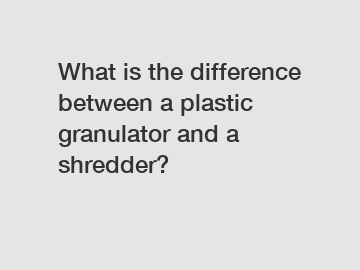What is the difference between a plastic granulator and a shredder?
What is the difference between a plastic granulator and a shredder?
Plastic waste management plays a crucial role in the preservation of our environment. Recycling technologies have advanced tremendously over the years, offering innovative solutions to deal with plastic waste effectively. Two commonly used machines in the recycling industry are plastic granulators and shredders. While they both serve the purpose of reducing plastic waste, there are significant differences between these two machines. Let us explore these variations to gain a better understanding of their respective functionalities.
1. Size reduction:

- Shredders: Shredders are primarily designed to reduce the size of plastic waste by tearing it into small pieces or strips. They use rotating blades to cut the materials into smaller fragments, making them easier to handle for further processing.
- Granulators: On the other hand, plastic granulators focus on reducing plastic waste to even smaller sizes. They achieve this through a combination of cutting blades and a sizing screen. Granulators produce consistently sized plastic flakes or pellets that can be utilized in various manufacturing processes.
2. Output material quality:
- Shredders: Due to the tearing action of the rotating blades, shredded plastic materials often have irregular shapes and sizes. This makes them ideal for applications that do not demand a specific particle size or shape. Shredded plastic is commonly used as a fuel in waste-to-energy plants or as a raw material for lower-grade plastic products.
- Granulators: One of the key advantages of plastic granulators is the ability to produce uniform and well-defined shapes and sizes. This makes the granulated plastic suitable for a wide range of high-quality applications, including the production of new plastic products or as a material for compounding and extrusion processes.
3. Energy consumption:
- Shredders: Typically, the energy consumption of shredders is lower compared to granulators. As their main function is to tear the plastic waste, they require less power to perform the task. This makes shredders an energy-efficient option for size reduction purposes.
- Granulators: The more intricate process of granulation requires additional energy input. Granulators employ cutting blades and sizing screens, which demand more power to produce consistent flake or pellet sizes. While they consume more energy, granulators are essential when the final product requires a specific shape and size.
4. Versatility:
- Shredders: Shredders are versatile machines that can process various types of plastic waste, including bottles, containers, films, and more. The ability to handle different kinds of plastic waste makes them suitable for a wide range of recycling applications.
- Granulators: Plastic granulators are primarily designed to process rigid plastic materials such as pipes, profiles, and industrial scraps. Their cutting mechanism and sizing screens are optimized to efficiently handle these materials. However, granulators may not be as effective in processing flexible or thin plastic films.
In conclusion, the difference between plastic granulators and shredders lies in their size reduction capabilities, output material quality, energy consumption, and versatility. Shredders are ideal for reducing plastic waste into small pieces, while granulators go a step further to produce consistently sized flakes or pellets. Shredded materials are commonly used as fuel or for lower-grade applications, whereas granulated plastic finds application in various high-quality manufacturing processes. Energy consumption is generally higher for granulators, but they offer the advantage of producing well-defined shapes and sizes. Ultimately, the choice between a plastic granulator and a shredder depends on the specific requirements and desired output of the recycling process.
If you want to learn more, please visit our website plastic film crusher machine for HDPE bottles, plastic flakes washing line, bottle plastic washing line.
256
0
0

Comments
All Comments (0)